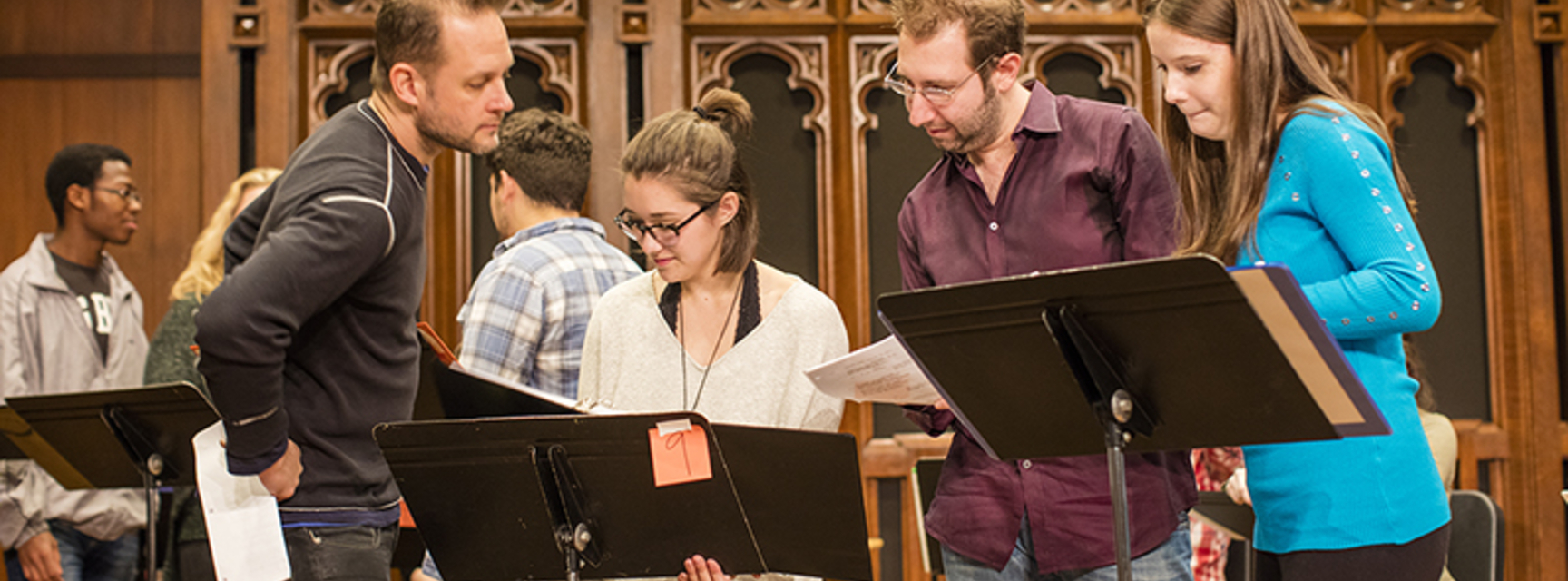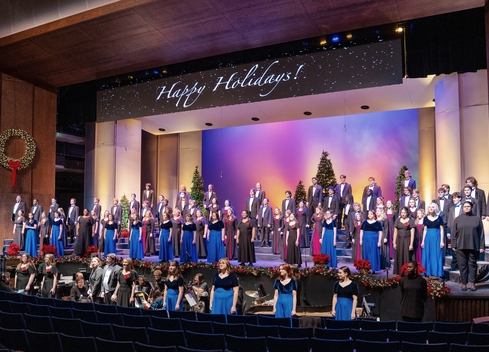The BM in Music Education program delivers a four-year, comprehensive curriculum that leads to K-12 licensure in the State of Illinois.
Music Education, B.M.

-
StudentSpotlight
As Adriana has continued to step into the spotlight, their busy schedule is filled with opportunities that have pushed them into new areas of performing, including being a member of Millikin’s Treble Choir, University Choir, OneVoice Vocal Jazz Ensemble, BlueBop Vocal Jazz Ensemble and Dissonance A Capella.
Overview
Program Highlights
This program includes concentrations for instrumental and vocal instruction.
Click here to find the plan of study
Audit Sequence
Courses
Departmental Course Offerings
Courses change each semester, so this list should not be considered a commitment to these individual topics. However, this does represent a list of many of our current and popular courses. The list is provided so that you can begin to imagine your academic career at Millikin in this major.
Introduction to Music Education This course serves as an introduction to the history, philosophy, learning theories and methods that provide a foundation for music education in the U.S. in the early 21st century. Through discussion, observation, journaling and practice teaching students learn basic planning and presentation techniques and examine issues, questions, and trends that define the profile of music education in contemporary American society. The class also contains a component that addresses current technologies that can be used to enhance music instruction and an opportunity to work with teachers in area schools. (ME251) Music Theory I Rudiments of music: key signatures, scales, triads, seventh chords. Diatonic harmony, basic rhythm skills, critical listening. Second semester emphasizes diatonic part-writing, analysis of basic modulations, and small forms. **Satisfies University Studies Quantitative Reasoning requirement, Coordinated with MT113, 114. (**Students must meet Quantitative readiness by having a ACT Math sub-score above 21 or Pass MA098 or equivalent)(MT111, MT112) Music Theory II Study of chromatic harmony and analysis of larger forms in historical perspective. Coordinated with Ear Training 213. Pre-requisite: MT 112/114. (MT211) Ear Training I Emphasis on reading and singing skills, basic solfege. Rhythmic, melodic, and harmonic dictation; error detection. Coordinated with MT111, 112. (MT113, MT114) Ear Training II Continue to develop skills acquired in MT 114. Chromatic examples used in dictation, reading, and singing. Co-enroll with Music Theory 211. (MT213) Introduction to Music Education Designed to provide an introduction to the history, philosophy, learning theories and methods that provide a foundation for music education in the U.S. during the 20th and early 21st centuries. The tools of observation, interviewing, journaling, and planning for teaching are studied and practiced. Special emphasis on societal trends that have been catalysts for change in music education: school reform, civil rights, and technology. (ME251) Principles and Methods of Elementary Music Education Knowledge, skills, values and dispositions necessary for delivering comprehensive music instruction to children grades K-5. Developmental appropriateness, careful sequencing of rhythmic and tonal concepts, and the selection of high quality musical materials are fundamental to the pedagogy taught in this course. Students will observe the professor teaching children in a laboratory school setting, and then plan and teach those classes themselves during the second half of the semester. Pre-requisite: ME251or consent of instructor. (ME341) Principles and Methods of Instrumental Music Education Principles, methods, and materials for teaching instrumental music at all levels. Topics will include philosophy and history of music education, lesson planning, learning theories, rehearsal techniques, repertoire, and program administration. Pre-requisites: ME251, MT406 and admission to Teacher Education Program. (ME450) Principles and Methods of Secondary Vocal Music Education Focuses on teaching pedagogy and curriculum for vocal music education at the secondary level. Pre-requisites: ME251, MT408 and admission to Teacher Education Program. (ME451) Supervised Music Teaching Fourteen weeks of full-time music teaching experience in public schools under the direction of qualified cooperating teachers. Pre-requisites: ME460 or 461, good standing in the teacher education program (see requirement for student teaching under School of Education – Student Teaching Experience), a minimum 2.7 GPA in music (excluding ensembles), and meet grade requirements in core music education classes. (ME470) Instrumental Music Education Seminar and Practicum Practical application of methods and techniques for teaching instrumental music in school settings. Students will work in a local school instrumental program under the guidance of the professor and on-site teacher. Teaching and directing jazz bands and marching bands, and creating marching drills will also be covered. Pre-requisites: Music Education 450, successful completion of the Class Piano Barrier, and admission to Teacher Education Program. (ME460) Survey of Western Music I Introduction to the critical study of Western music history, including representative composers, works, and genres, as well as significant concepts and issues, antiquity-1800. Pre-requisite: MT111/113. (MH211) Survey of Western Music II Introduction to the critical study of Western music history, including representative composers, works, and genres, as well as significant concepts and issues, 1800-present. Pre-requisite: MT111/113. (MH314) Twentieth Century Music Twentieth Century compositional techniques, with an introduction to jazz and popular harmonic practice. Pre-requisite: MT211/213.(MT212) Introduction to Ethnomusicology An introduction to the theoretical principles and research tools used in ethnomusicological inquiry. Various musical traditions are explored through performance, recordings, texts, and primary research. Pre-requisites: MH211 and MH314, music majors and minors only. (MH316) |





